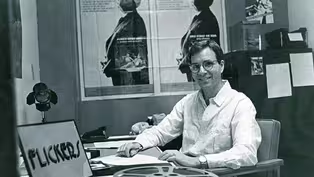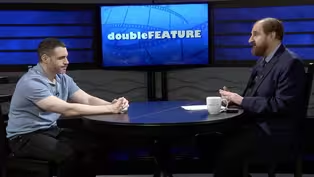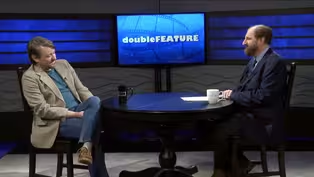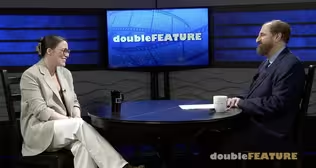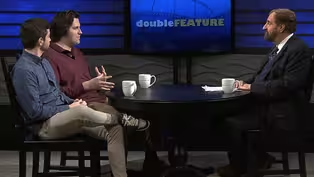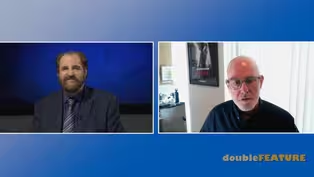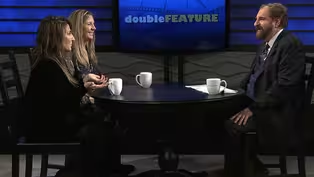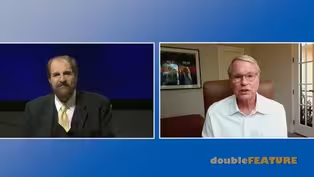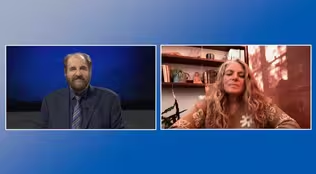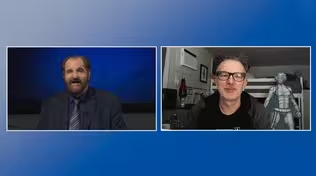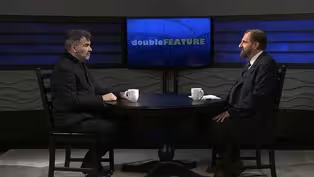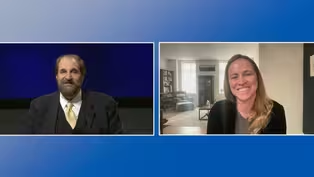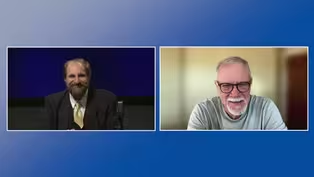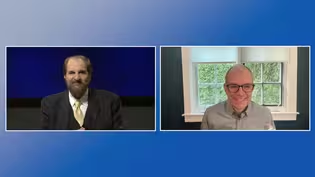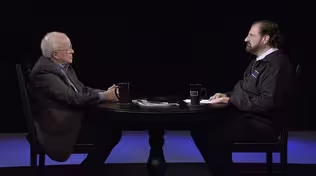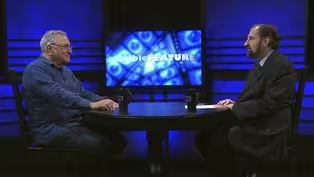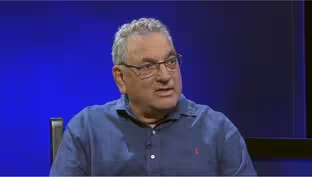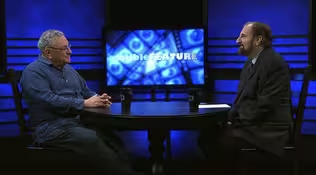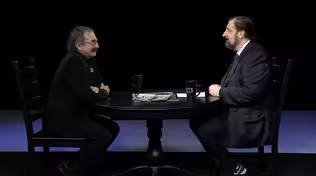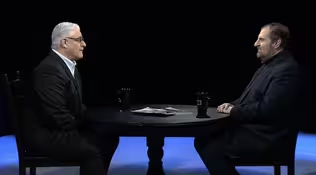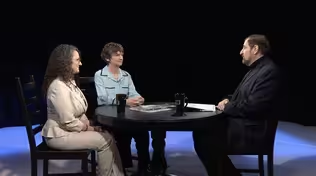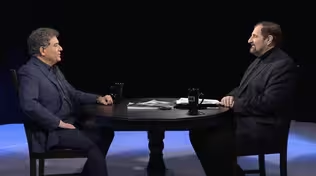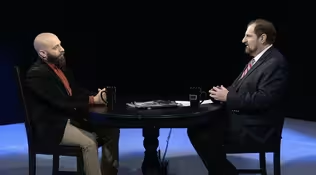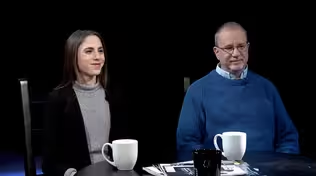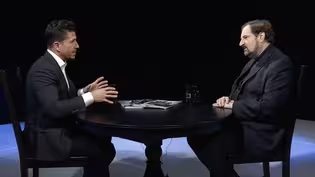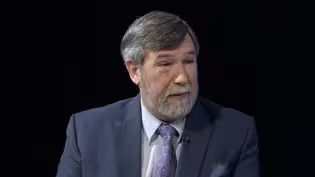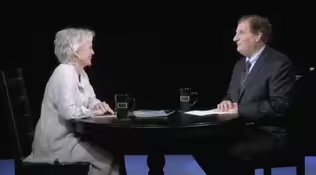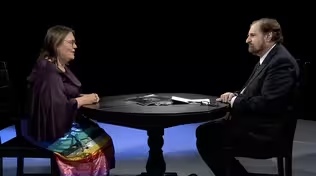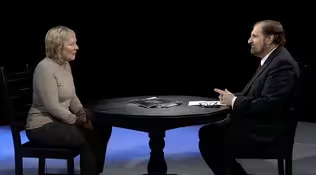
Interview with Tom DeNucci
Clip | 44m 59sVideo has Closed Captions
Steven Feinberg interviews director, writer, and actor, Tom DeNucci.
Steven Feinberg Executive Director of the Rhode Island Film and Television Office, interviews Tom DeNucci. Tom is a prolific director, writer and actor. He has made films with such prominent and award-winning actors such as Chaz Palminteri, Theo Rossi, Don Johnson and the ever-popular Megan Fox.
Problems playing video? | Closed Captioning Feedback
Problems playing video? | Closed Captioning Feedback
doubleFEATURE is a local public television program presented by Rhode Island PBS

Interview with Tom DeNucci
Clip | 44m 59sVideo has Closed Captions
Steven Feinberg Executive Director of the Rhode Island Film and Television Office, interviews Tom DeNucci. Tom is a prolific director, writer and actor. He has made films with such prominent and award-winning actors such as Chaz Palminteri, Theo Rossi, Don Johnson and the ever-popular Megan Fox.
Problems playing video? | Closed Captioning Feedback
How to Watch doubleFEATURE
doubleFEATURE is available to stream on pbs.org and the free PBS App, available on iPhone, Apple TV, Android TV, Android smartphones, Amazon Fire TV, Amazon Fire Tablet, Roku, Samsung Smart TV, and Vizio.
(film whirring and clicking) (action-packed music) (action-packed music continues) (gentle music) - Hi, I'm Steven Feinberg, executive director of the Rhode Island Film and Television Office.
Our guest tonight is a prolific director.
He's a great writer and actor, and he's made movies with such prominent and award-winning actors as: Chazz Palminteri, Theo Rossi, Don Johnson, and the ever-popular Megan Fox.
I am happy to welcome my friend Tommy DeNucci to "doubleFEATURE."
How are you, pal?
- I'm doing great, Steve.
It's always nice to be right here at PBS studios in my hometown of Cranston, Rhode Island.
- All right, well, welcome.
So you've been, I know your schedule is nuts, so I want to thank you for, A, taking the time out.
What, do you have like four or five different projects that you're juggling at the same time right now?
- Yeah, right now it's all about finishing a couple of films that I shot earlier in the year, as well as developing a couple that I plan to shoot a little bit later in the year.
So we're kind of, we're putting a couple to bed while we're getting a couple ready to go.
- Plus you're working on a documentary as well.
- Working on a documentary, you know, it's a lot like I break it down like different subjects, like you're going to high school, like, we're gonna be changing classes so I'll work on one project for an hour or two, then I'll work on another one, then I'll work on another one and keeps it all kind of fresh.
- That's nice.
It's always you have something to look forward to.
So you're leaving the science class, to go to the history class- - Exactly.
- to go to the foreign language class, but they're all... Now are these films in different genres or?
- Yeah, a lot of these films are in different genres.
I've always loved to, you know, when I first started making movies, it was really just like, I didn't care what genre it was, I just wanted to make a movie.
And at the time, horror movies were kind of a great genre for young filmmakers to get in and cut their teeth on.
So I did a lot of horror movies early on, but I didn't want to kind of get the stigma of like, "Oh, he's one of those guys."
kind of thing.
So I quickly tried to shift gears into some other things and I really love just telling a lot of different stories.
I like to think of myself as a little bit of a genre bender.
- Oh, there you go.
- You know?
- There you go.
- I kinda like to tell stories in all these different worlds, but lately crime dramas have been kind of- - You seem to, you be... - I've been gravitating towards those.
- Yeah, gravitate towards the crime drama.
Well, let's talk, so you're a filmmaker who went to New England Tech, you did some work there, you worked with Chad Verdi on some of those productions, and as you said, you made some horror movies, and then you took a big jump and did a movie called "Vault," with Chazz Palminteri was in that, Don Johnson was in that, Theo Rossi.
Who else was in that film?
- Well, we had Samira Wiley, Vincent Pastore's in the film, Clive Standen, William Forsyth- - William Forsyth!
- who I absolutely love.
- [Steve] He's a great character.
- Yeah, that was a really great film.
I loved making that movie.
You know, that one, Chad Verdi produced that movie and you had mentioned Chad kind of gave my first opportunity in the business and it was really great to be able to kind of make a movie at that level with Chad and that was kind of a really nice moment for us.
And the great thing about the Bonded Vault story, 'cause we're basically telling the story of the Bonded Vault, which is this famous heist in Rhode Island folklore.
And it's cool 'cause that was a story that I had heard about, you know, growing up as an Italian American kid, you know, you hear a lot about these stories of these wise guys and they're almost like Paul Bunyan of our, you know, they become like these kind of tall-tale-type figures.
And hearing the story of the Bonded Vault my whole life, I was kind of fascinated by it.
So to be able to actually tell that story and put it all on camera, that was a real thrill for me because, you know, again, it's just like a story that you've heard so many times and to be able to kind of like relive it through film.
It's special.
- What was it like working with someone, 'cause I really think the guy's a great actor, like Don Johnson, you know, he did "Miami Vice" and all, but the guy is a, I think he's a phenomenal actor with a lot of charisma.
- Lemme tell you, Don Johnson, if you look up cool in the dictionary, like his picture's like just right next to cool, like, it doesn't get much cooler than Don.
There's an intangible quality that someone like Don has, how they carry themselves, but at the same time, it could be a little intimidating.
- And he's been in like those Quentin Tarantino movies and.
- Yeah.
Yeah, and I was definitely intimidated by him at first because he has that kind of, you know, charisma - Aura, yeah.
- That aura about him.
So I remember the first couple times working with him, being a little nervous.
I remember I gave him one note, like the first day, and he kinda looked at me funny, like, and I was kinda like, "If that's okay."
And he was like, "Okay."
And he did it.
And I was like, "Okay, okay.
We got a little momentum going.
I gave him a note, he did it.
We're good now."
And then after that, everything was kind of cool.
But I was nervous at first.
- When you meet him for the first time, are you discussing like, "How do you work, Don?
Do you have preferences?"
What's it like working with that?
- You know, some of that's a feel out process.
It's kind of funny, you know, with a guy like Don- - Because you're an actor too.
You're an actor also.
- Yeah, I am.
And I try to, you know, again, like, I love acting, but I kind of, I'm not saying that I don't want to do it or it's not something I like to do, but I always kind of got into acting just so that I could learn the language to be a better director so I could kind of like, speak their language, know what they might be going through.
And with Don, you know, we'll compare, say Don, to, you mentioned Chazz Palminteri- - I was gonna ask you about.
Right.
- They were both in that movie.
With Don when I would give him a note, and again, you kind of gotta just feel this out, you don't always know.
But I'd have to go up to him, whisper, take him off to the side, we'd have a conversation about it, and I'd just give him a note and then he would go do it.
Chazz came up to me early on and he just said "Tommy, listen, if you got a note, we'll just keep the camera rolling.
I like to keep the camera rolling, so just don't call cut, just shout it out and I'll do it."
And I was like, "Okay, great."
So again, every actor is different.
Every actor, you gotta kind of feel that out early on.
Like your first day or two with an actor is almost just feeling 'em out.
Like in a boxing match that first round, the two fighters are kind of just feeling each other out.
- Are you having, 'cause I was talking to a director about Robert Duvall, and he had said the same thing.
He had said, Robert Duvall just, "Hey, if you don't like it, just tell me to do it again.
And, you know, just keep it moving."
Are you meeting these guys?
Like are you talking to them during the casting process, or, so when are you first time having those meetings?
- You know, every situation's different.
You know, I've directed movies where certain talent's already attached and I come in and then we'll have like a Zoom call or just a regular, old phone call.
But a lot of times yeah.
You know, it'll be narrowed down to a couple pieces of talent.
And then sometimes you'll have like your introductory Zoom calls and just have a conversation and see if there's a chemistry there and if it's gonna vibe.
You know, you gonna spend a lot of time with these people, so you can usually tell in that first conversation like, "All right, I think we're gonna work well together or not."
You know, so a lot of times it's like an initial Zoom call.
And then, like I said, a lot of times too, you just show up day one and it's like- - Like you're doing a TV show.
It's almost like, there they come.
So you're not really having rehearsal time.
Right?
- No, there's very little rehearsal time.
And what I always try to do is I feel like, you know, the mornings, and I use that word loosely because sometimes it won't be the morning, it might be the nighttime if you're shooting overnights.
But first thing, when I show up on set, if I know that like my lead or, you know, whoever the star is, I try to find out where they are.
Usually they're either in their trailer or dressing room, whatever.
I go up to them, I introduce myself.
I tell them any little fun ideas that I have for the day.
I try to get them excited about the day, and then I ask them if they have any concerns.
I try to get all that stuff out of the way early 'cause the worst thing is you're in the middle of a scene and then all of a sudden there's an issue that they have.
And you wish you maybe talked about that earlier.
So I always just try to set the tone early in the morning and just, you know, have any of those creative conversations right off the bat.
- What about, let's talk about blocking as an example.
Do you leave it up to the actors, so to speak?
Or are you planning the blocking and, you know, or is it collaborative?
- Well, it's funny, Steve, I have a very unique way of putting together my blocking structure in my playbook, I'm a grown man who loves action figures and I still play with my G.I.
Joes.
And in pre-production, I will sit there with my G.I.
Joes and I'll line 'em up and I'll take pictures and I will basically put together the blocking and storyboard with the figures.
And what I find that does is it really like lets me visualize the scene.
And it's kind of fun because I'll then show the actors the photos of the little men in the scene.
And they always crack up.
Like the first thing they do is crack up.
They're like, "That's me, that's me.
I'm this guy right here."
I'm like, "Yeah, you're Captain America.
And right here you can see that Spider-Man, he's coming in," so first off, it cuts the tension a little.
'Cause they laugh.
It's kind of cute.
And I think they realize like, "Wow, this guy's either a little nuts maybe, but he gives a care, you know?
Like, he spent the time to sit there with these guys and block it out."
And I find that when you come with a plan, the actors are less likely to change things.
But when you don't have a plan, then they might take over and "I think I should walk this way.
I should go by the window."
So the more you have a plan, the less they will kind of go against the- - And when you're doing that with your action figures, are you thinking of those motivations of why this Captain America will come over here and...?
- Yeah, it's great because you can literally light the scene how you want.
Like, if you want it to be a pool of light, like I have little flashlights and little lamps, and I'll set it all up.
"Oh, I want a nice pool of lights."
So we'll light 'em from above and I'll snap that photo.
And yeah, I mean, you get to be making the movie in a very small, simple broken-down- - Like a diorama.
- Diorama kinda way long before.
And while I'm doing this too, I'm playing my music that I like that gets me inspired that I'm, you know, every time I make a movie, I create a playlist of about 10 to 20 songs that kind of sing to the movie.
So I'll get that music going, I'll have my little men out, have a cup of coffee.
You know, made my happy place.
- Yep.
That's great.
So you don't have real time to rehearse though, right.
So when they come on the set, you've got your crew waiting for you at that time?
- You know, with the dialogue and you know, dialogue-driven scenes, you don't have time to rehearse.
But recently in the last couple of films that I've made, I've had some time to rehearse the fight scenes.
And that's when I get to have a lot of fun.
You know, in the movie "The Collective," which I just did last year with Don Johnson and Tyrese Gibson's in that film.
And Lucas Till is the lead in that.
- Had a lot in that, and the actor, the wrestler, what was her name?
- Mercedes Mone, AKA Sasha Banks for the WWE fans.
She's in the movie and Ruby Rose is in the film.
And that was an action driven-movie and- - Lot of production value.
- Yeah.
A lot of fights.
It was like being a little kid playing with my little guys only in real life.
It was kind of fun.
But what was cool about that is getting a chance to spend literally days before we even turn the cameras on with the stunt coordinator, the stunt team, all the actors going over the beats.
And that's when you learn like, "Oh, you know what?
This doesn't make sense."
You know, it's great to have the time to do that stuff when the cameras aren't rolling and when there's not a hundred people waiting around for you to make a decision.
- Right.
- You know?
- So you're doing all those preparations, what, in a warehouse somewhere, or?
- A lot of times it'll be at the hotel.
You know, like if if production's staying at a hotel, we'll like, you know, rent out one of the function rooms and just- - Are you then videotaping, filming those rehearsals?
The action sequences.
- The stunt coordinator will put together a pre-visualization video of everything.
And it's kind of fun, man.
Again, like, you know, I've been very fortunate to kind of like, have my career go from like, you know, making some smaller movies to like, each movie I get a chance to get a little bigger and a little bit more budgetary, you know, flexibility to work with.
And as I make new movies and get to see these new elements into the fold, one of them is these previses and it's really cool.
The stunt coordinator will give you a video of the scene.
They'll edit it together and everything.
And you look at it on your phone and you're like, "Geez, all right, well."
- "Works for me."
- "Makes my life easier."
And I used to like toil over trying to figure out like, oh, 'cause fight scenes are different.
It's a different animal.
Like, you know, that's why, a lot of people don't realize this, but the stunt coordinator often works almost as a second unit director helping to direct the fight scenes 'cause you've heard of the word sell, you know, to sell the shots, like it's all, you gotta have a really- - Where the camera's going.
- specific angle, and they're experts at it.
They know, right where to put the camera.
'cause they don't wanna look bad.
There's nothing worse than you see a guy miss by a mile on camera.
It looks terrible.
So I love getting a chance to, you know, as I level up, just kind seeing all these new, not only toys and equipment that you get to work with, but experts and people that kinda, they all just make it better.
- Now are you using, when you're doing like "The Collective," do you have one camera or two cameras?
Like obviously when you're doing some action scenes, you might have more, or car chase, but primarily when you're doing like, let's say the dialogue scenes, one camera, two cameras?
- In a perfect world, when all goes well, you'll have two cameras, you know.
On "The Collective" I had two cameras, "Vault," we had two cameras.
But you know, on some of the smaller movies, if you don't have the budget, you gotta go with one.
Because what people don't realize is, you know, each camera, it's not just about renting that camera.
There's a whole support system of human beings that you need that's about an extra, for each camera that's about an extra five people that you gotta hire 'cause now you got another camera operator, you got a first AC, a second AC, a camera PA, maybe even an additional camera PA.
So it's like on the smaller movies, you have to work with one camera and it can be challenging 'cause it takes more time.
But in a way it's kind of nice because then you're just so focused on that one shot.
So I don't mind doing it, but always would prefer two.
- I noticed like on TV they tend to use more than one camera.
So they might have the wider shot or the two-shot and then a closeup, then they do a little reverse.
- Yeah.
And especially when you're doing stunts.
- Oh yeah.
- And then, you know.
- That you need multiple cameras.
- Just because you wanna protect your stunt performers.
It's like, "Hey, we need you to go through that window."
- We're not gonna go over and over and over again.
- Let's just get a few cameras and do it once rather than having to do it several times.
- Talk to me about, you've got this web series, right?
It's called "The Florist."
Go ahead talk about it.
- Yeah.
So "The Florist" is something new.
It's a little bit of an experiment that I'm trying.
You know, every 10 to 15 years, the industry changes so much in terms of like how we watch our stuff, for lack of a better phrasing.
When I first- - Content.
How can we distribute content.
- Where you're watching your stuff.
- Right, right.
- So when I first started this business, it was all about the holy grail was "You've got a DVD deal, they're gonna put your movie on a DVD and it's gonna be in Walmart."
Well, guess what?
That's gone.
You know, like Best Buy, literally the other couple weeks they announced, "No more hard media in the stores."
It's all gone.
- Which I think is a shame.
- It is a shame 'cause there's nothing like having that tangible item.
- And then you also get some of the extras that come with it and the quality.
- Yeah, there's something nice about just having- - Physical.
Physical.
- physical media will always be a thing.
But for the most part, people aren't doing it anymore.
Now everything's streaming and we have these major platforms.
You get your Netflix, you get your Amazon, you know, there's a million of them.
- Streaming.
Right.
- But in the future, I say to myself, "Well how will that change even in 5, 10 years?"
And what I'm seeing is more and more artists are essentially creating their own platforms just for their own content.
So I have a show called "The Florist," which I created with Glenn Ciano, a dear friend of mine, fellow filmmaker.
And we decided to do something kind of all on our own where we didn't have to be, we didn't have to give up control to any distributors, to any financiers.
We were going to call all of the shots on this one, both creatively and how we market the product.
And we're gonna put it on Patreon, which, Patreon is a really exciting, basically it's a platform for creatives to make their own channel.
It's almost like you could create your own network.
- Network.
Right.
- And right there on my Patreon channel, I've got my shop and people can go and if you Google "The Florist" and look up my Patreon page, you'll be able to go and- - What is the Patreon page?
- So you look up, you just go to www.patreon.com.
And then you'll in the search bar, just like any other, just like you're looking up any other, you know, like you're on iTunes, you would just type Tom DeNucci in.
I would come up.
- Is it under Tom or Tommy?
- It's under Tom DeNucci.
- Tom DeNucci.
- And you'll be able to basically for free, you can join the page.
And then I have a shop on there, like a My Shop.
And on the shop you'd be able to get a copy of "The Florist" for three bucks.
It's the price of a cup of coffee.
Where, can you beat that?
- So this is your pilot episode?
- Yes.
- And what's the concept of "The Florist?"
- "The Florist" tells a story of a father-and-son duo.
I play the son and he's a little too old to be living at home and he is battling with some mental health issues.
His father, as far as he knows, is a happy-go-lucky, friendly florist.
And then later in the show, through some mistaken identity, the young man realizes that his father has actually been moonlighting as a hit man this whole time.
And now his son realizes that, "A, This is kind of crazy.
My dad's a hit man, and, B, I want in.
(Steve chuckles) How come I'm not in the family business?"
So this depressed young man realizes that the only thing that makes him feel good- - He's trying to find his way in the world.
- He bonds with his dad.
- Yep.
- And he finds life through death in a sense.
- That's a really cool series.
- It's "The Florist," baby.
- Now, have you planned out the future episodes?
- Yeah, so it was one of those things, when Glenn and I first started writing it, we kind of wanted to arc out like what would say 5 or 10 episodes be.
So we have a a very good idea of where this story will go.
And we're hoping that episode one performs well and we'll have enough money to make episode two.
- So episode one, did you self-finance that?
- We went out to a few different financiers locally and you know, we're talking short money here.
You know, again, you know, I don't want to give away the exact number, but we're talking for the price of a used car and kind of a low-end used car, we made "The Florist" and we're hoping to get that back and roll it into episode two.
- I love that.
And how long is the episode?
- It is a 24-minute episode.
So kind of like your standard 30-minute episodic, you know, you figure once you have commercials and stuff.
So yeah, it's all available on Patreon, so check it on out.
- Looking forward to it.
Now is this something that you cast locally and like how big was your crew?
- So the crew was fairly sizable.
I had just come off of a Lifetime movie that I directed and I kind of just cherry-picked a few of the people that I liked working with on that crew.
And we just carried right over.
Fred Sullivan's in the movie.
Fred Sullivan is a- - Trinity.
- He was a Trinity regular for many years.
Rhode Island-based actor, super-talented guy.
He plays my dad in it.
And again, you know, Fred was actually- - Oh, so he's the florist?
- He's the florist himself.
Yeah.
And Fred was my acting coach coming up.
You know, when I was like 20 years old, (phone chiming) he was basically teaching me, this is so rude, excuse me, these Hollywood people getting phone calls in the middle of a program.
So Fred basically taught me everything I know about acting, and it was really fun to get a chance to work with him on in this capacity but also, Steve, you know, I'm a big wrestling fan.
So I was able to bring in a pro wrestler Tommy Dreamer to play a role in the series, which was really cool.
So I think people are gonna be excited by this cast.
Very, very talented group of people.
And it's all there on Patreon.
- Oh, excellent.
Looking forward to it.
Now, you were also, where were you, Louisiana?
Is that where you went to during- - Yeah, I was in Mississippi.
- Mississippi, Mississippi.
- I was down yonder in Mississippi and I just got back, we finished that movie a couple months ago and I'm in the post-production process now.
We're colorizing the movie.
- It's I'll edited, it's all... - We have what we call a locked picture and it's gonna come out really quickly.
It's gonna be available on Tubi later on this summer.
This was a Tubi original, this was my first time.
So this was my first time basically, essentially making, in a sense, a studio movie.
You know, this is a, Tubi financed this movie and funded it.
I co-wrote the script with Theo Rossi, who played the lead in "Vault."
- [Steve] And he's from "Sons of Anarchy," right?
- Yep.
Theo was in "Sons of Anarchy" for many seasons.
And we actually have another "Sons of Anarchy" connection in this movie, which is called "Dirty," Ron Perlman plays the main villain in the movie.
- "Hellboy."
- So yeah.
Hellboy, and- - [Steve] He also is the voice of the UFC.
Yes.
- That's right.
He's got a very iconic voice.
And Ron was just terrific to work with.
Just a real kind of, it was an education man.
I mean, just sitting and getting to talk to him and mentioning, you know, just referencing so many different films that I had never even seen or heard of.
And I'm just sitting there like, "Okay, gotta go, gotta go watch that.
Gotta go watch this."
Like, just taking my notes.
But learned a lot from Ron and it was great to work with Theo.
- I think Ron was "Beauty and the Beast was his- - He was.
- That was his big entree.
- That's right.
- Yes.
- With Linda Hamilton.
- Yes.
That was a big to-do.
So what is "Dirty" about?
- "Dirty" is about a dirty cop played by Theo Rossi who works for a casino owner, who is also a pretty nasty guy.
And the biggest gangster in this little casino town.
- [Steve] Is that who Ron Perlman plays?
- That's played by Ron Perlman.
And Theo's character basically finds out, "Hey, internal affairs is onto you.
They are going to bring you in tomorrow, you're going to jail."
And he realizes, "I gotta get outta town, I gotta cash in, I gotta take all of my money and get out here."
The Ron Perlman character basically says, "Ha!
Not so fast.
You can't just get out of this.
You don't get to just quit.
This isn't like working at Denny's.
You gotta do something for me if you wanna leave."
So basically in one night, Theo's character must take out all of Ron Perlman's character's rival gang members.
He's gotta go on a little bit of a, "see a boss, kill a boss" kind of spree.
And it's all gotta go down in one night.
And if that happens, he'll be granted his freedom and he can leave town.
So it's kind of this, it's almost like a Western, you know?
- I was gonna say, it's a love story.
(laughs) - It's a, you know, it's a light comedy.
- Right?
No, that sounds very, very intense.
- [Tom] He's got a lot to do in one night.
- Yeah.
How many rivals are there?
- There are four gangs that he's gotta take out.
- He's gotta pick 'em off.
- And the cool thing is, and you know, since he knows them, he's kind of able to kind of infiltrate and go in as one of them and then kind of surprise 'em.
And it's unique.
Each gang that he takes out, he kind of goes with a different approach on how he's gonna take them out.
- And they're all different like "Warriors," you know, like?
- We've got the Italians, we've got a Latin American gang, we've got a biker gang.
Yeah, like, it is kind of like "The Warriors" in that sense, where each gang has its own- - Identity.
- Kind of identity.
Yeah.
- Yeah.
And how many days did you have to film that?
- We shot that whole movie in 14 days.
- [Steve] Wow.
- Yeah.
Right in Mississippi.
And it was a breakneck pace, but we got it all done.
And I'm thrilled with this production.
I can't wait for people to see it.
It was produced by Demetrius Stear, who's, first time working with him as a producer and- - How did you hook up with, how did this all come together?
- This all came together 'cause of Theo, you know, it's kind of funny, man- - [Steve] You've become really good friends.
- Yeah, Theo and I have become really close.
You know, we made "Vault" together and, you know, we were always buddies.
But in the last year or two, it was kind of funny, man, just about probably, you know, 18 months ago, 16 months ago, I got a fairly random call from him and he was like, "I got this script.
It's a concept that needs a lot of work.
Are you interested?
It's an action movie."
And I looked at the script and I was like, "Yeah, of course.
We could do a lot with this."
And we took what was there already and we kind of just did a page one rewrite.
And it was cool because that was the first time Theo and I had actually written anything together.
And now- - You're doing this like via Zoom, on the phone?
- Yeah.
Yeah.
We're on the Zooms or we're on the phone.
And it's kind of funny.
We'll, you know, just get it in anytime we can, you know, even if it's just 20, 30 minutes, you know, that's why not to turn this into like a whole advice column, but a lot of times a lot of writers, they'll tell me like, you know, people wanna write a screen, and be like, "I just can't, I just don't have the time.
I can't get it in."
And I'm like, "Yeah, listen, you know, we write like an hour a day," you know?
It's really, sometimes if you can just dedicate that hour a day, you write a couple pages a day for an hour a day, in a couple months, you're gonna have like almost a full screenplay.
Like, it's just about that dedication.
And that's what we do.
We're very convicted in making that time every day.
And, you know, hey, not every day you're gonna write good stuff.
Some days we write, it's a crappy scene, but I'd rather write a crappy scene than no scene at all.
- It's like working out.
You're doing it, you're making it happen.
- You're there.
- You're flexing those muscles.
- Exactly.
- And so you guys, you wrote it and then you went and got funding for it.
- Well, it was one of those things where, and this is a a little bit more, you know, Demetrius, my producer, could explain it a lot better than me, but Tubi funded the film basically.
You know, they have a slate of X amount of films that they've gotta put out and this was one of 'em.
And, you know, we were thrilled to be working with Tubi and it's a great platform.
And what I'm really excited about working with a platform like Tubi is, it's free.
You know, like everybody can get Tubi.
- Oh, okay.
- It's a free streaming platform, you know.
So it's one of those things where when this movie comes out, it'll be very easy for me to just tell everybody, "Go on Tubi and check it out.
You literally have no excuse."
- Wow!
- "It's free."
- So how are they making money?
Through advertisements in between the films?
- Exactly.
When you watch the movie, every, you know, just like you're watching a movie on TV, every few minutes, well, every, yeah- - Oh, they do break it up?
- Every 15, 20 minutes you'll get a commercial or a stop set.
You know?
Yep.
And that's how they make their money.
- Yep.
Now you're also doing like a, you have your own YouTube, what?
Your own YouTube network?
- [Tom] Yeah.
I have a YouTube channel.
- YouTube channel.
- If you go on YouTube, I would love for you to subscribe to my channel.
You just type in Tom DeNucci and you'll find me.
And I love it, man, you know.
What's great about YouTube is it allows me the chance to create every single day.
I'm a junkie for creation.
I love it.
Like, every day I need to make something, even if it's just like a video of my cats doing something silly.
I have to capture something and film it.
And having my YouTube channel, I'm allowed to create every day and find a way to reach out to my audience and put up content and make videos.
And I have a weekly podcast called "AND ACTION" with a friend of mine called Mike Messier.
So the YouTube channel is just like a nice way for me to kind of, again, like just stay sharp creatively on a regular basis.
- You had that boot camp, the film boot camp, - The Fall Film Camp.
- Yep.
The Fall.
Are you gonna do that again do you think?
- You know, it was a really great experience and I got such great feedback.
I would love to do another film camp.
I don't know exactly when I'll do another one.
You know, maybe we'll do another one this fall.
It kind of depends on- - Schedule?
- You know, scheduling and what's going on.
Because that's the wild thing about being a filmmaker, you know, it's not like having your standard nine to five.
I mean, it's something that a lot of times people will ask me about, "Oh, what are you doing on, you know, on this day?
And it's just like, "I don't know."
Or, you know, a family member will be like, "Oh, it's so-and-so's confirmation in May, will you be available?"
"I don't know."
- (laughs) Right.
- "I could have a job by then."
- Right, right, right.
Now let me ask you something.
You're writing, you're directing, you're acting.
Do you have a preference?
Like what do you, if you could only pick one?
What would you?
- It's so hard, man.
Well, real quick, like, I love writing 'cause it's a solo sport.
I love the solitary nature of being in my little writing room with my music.
And it's very peaceful.
- So when you're writing like myself, you write with music in the background, - Music, coffee, whatever I need to get me through.
And it's a very peaceful solo sport.
Acting is fun because you get to be a character.
You get to kind of unlock- - Collaborate too.
- Yeah, collaborate and unlock this part of your personality that you don't always get to show off.
You get to become somebody else, which is very unique.
But above all my favorite's directing, because directing is really, you're kind of- - Controlling the whole.
- You're just in control of everything from, it becomes your child.
The movie really becomes your child.
You see it from the beginning to the end and it just becomes so personal, you know?
And I really love that kind of ability to see it all come together.
I love reading a script and then watching it come to life.
I love handing off my script to other artists and having them make it better- - Interpret it.
- And interpret it in a way I could have never even imagined, which is fun.
So I think directing probably provides the most- - Fulfillment?
- It's the most fulfillment.
And it is, you know, again, just to be real with people, like, it's probably the most, financially the smartest play for me because acting's a tough, it's a tough game, man.
You know what I mean?
Like, you're not gonna be booking all the time.
And it seems like when- - It's hard to make a living.
- That's what I, yeah, a consistent living can be made a lot easier as a director because it's a lot easier to wrap your head around like, "Okay, I'm gonna direct these couple projects, this is how I'm gonna do it.
I'm gonna bolster my income by writing some scripts."
Acting, it's like, you gotta pray that you get that part.
- Well, I tell people too, they say they want to be an actor and all, well, you could be a working actor doing community theater and be satisfied if it's just about acting or being on, you know, and doing a stage play.
But making a living as a film or TV actor is like being in the NBA.
- I was just gonna say, Steve, it's like, you might as well be playing for the Red Sox.
Like, it's that.
- Right.
- And really it's that unique of a skillset.
To be that good, like, there are that few people hanging around, like, it's very difficult.
And, you know, hey, maybe that's why I went and put "The Florist" out because it gave me a chance to act a little bit and get to scratch that itch, be creative, But at the same time, not have to rely on it to like, feed my cats.
- I was watching a movie the other night, It's coming out in a couple of weeks, and there's like some top-notch actors.
And then Robert De Niro comes on and he just comes and devours the screen.
- It's like a spotlight.
- It's unbelievable.
And these were top-notch actors, but his scenes are, and they're not big scenes, but he commands it.
- Yeah, well De Niro's one of my favorites.
- Yeah.
He really commands it.
So is there any project you can talk about with us now that you're excited about?
- Well, you know, I'm excited about something that I can't say much about it, but I'm writing a script right now that I'm very excited about because it has a lot of elements that I just love.
You know, it's a bit of a period piece, it takes place in the 1950s, which is a really kind of interesting time in American history.
You know, everything is so kind of wholesome, but- - On the surface level.
- On the surface level, it's wholesome, but we learn, and again, without giving away too much of my story, we learn that there's some darkness behind all that, you know, wholesome poodle skirts and the ice cream socials, you know.
There was still some nefarious things that were happening.
So I'm working on something that's really exciting.
I say it all the time.
I love the idea of time travel through movies, you know, we'll never really be able to get in the DeLorean and, you know, go back in time.
However, if you make a film, it happened to me on "Vault," man, we'd be on set on "Vault" and that movie took place in the '70s.
And I would walk onto set and I would see the actors with their '70s clothing, and I'd see the appliances that are 70 and the furniture and, for a second you believe that you're there and you are, as far as I'm concerned, maybe that's time travel, maybe we are.
You know, I feel like I'm in the '70s.
So I love that we can do that with film and kind of go back in time or jump forward in time.
- Now is that a film that you'll do in Rhode Island, do you think or?
- I think so.
I think so.
So, but I can't say too, I don't wanna get in trouble.
- Right, right, right.
- People will yell at me.
But I'm very excited to make that one.
I'm writing now.
It's been fun.
Again, with the music, listening to a lot of this 1950s music has been really exciting.
One of my tricks is I'll just go like, this movie's set in 1958, so I'll just go into my YouTube and I'll go 1958 Billboard Top 100.
- I do the same.
- And just let 'em rip.
- Yep, yep.
- Listen to 'em all.
- Yep.
- You know?
- Yep.
I'm doing that with the '70s right now.
- Do the top 100?
- Yeah.
And it's just like, "Oh wow."
You know, it's songs that you remember and just makes you feel good.
- And some that you've never heard of for me too, that I'm like, "Whoa, I love this."
Like, what is, who's King Cole, you know?
- Right, right.
- "King Creole."
- Some drummer.
There's like some drummer named King Cole that I really like.
- Right.
That's great.
- Like, "Who's this guy?"
- Any advice you have for some younger filmmakers, wanna-be filmmakers?
Any thoughts or...?
- Yeah, I do.
I've got a couple pieces of advice.
You know, the first one is just, it's so easy to make excuses for ourselves.
And I fallen victim to this many times.
You know, you start looking at people that are successful and rather than seeing what they did to be successful, you start saying, "Well, I couldn't do that because they did this or they did that."
And you start making excuses for why you're not there.
And I would say to anyone who wants to do it, just go out and make a movie with your cell phone.
Go out and write a story.
Like, don't make the excuses, whether it's, "Oh, I've got a job, or I've gotta work."
Find the time, you know?
Like sacrifice your sleep schedule.
Whatever you have to do, just create, because when you're creating and you're vibrating at that level, it's an amazing thing.
You know, whether you're working on a YouTube video that a hundred people are gonna see, or whether you're working on a feature film, it's an amazing feeling to have an idea, film the idea, and present it to people.
Like, that's just a great feeling.
- Well, like you're "Florist" idea, right.
"The Florist."
So how many days did you have to film there?
- We filmed the whole thing in three days.
- Three days?
- Yeah.
- Does it all take place at a florist store or does it move around a little bit?
- We move it around a little bit.
You know, we basically did like one day at a flower shop, we shot at my house for one day, and then we shot in Providence for a day.
And you know, we just kept it moving, you know, again- - Do we see a murder?
- You know, some violence will occur.
- Okay.
- There's gonna be some violence.
As the tagline says, "it's not all roses."
- Oh!
I like that.
- It's not all roses.
- Very clever.
- Yep.
- Are are you thinking of trying to sell that onto like a larger network?
- You know, there is- - It's very clever.
- There is something that I'm working on right now with, you know, I'm repped by Sovereign and I've been talking to some of the people there about, you know, taking it and trying to go the more traditional route.
Like basically like, "Hey, here's our pilot," and I'd be happy, you know, hey, if a network wants to buy the concept, blow it up.
Recast me, kick me out, hire someone else.
I'm A-okay with that, you know, I'd be happy to, as they say, just flip that real estate.
So that is an avenue that I'm going down.
But, you know, this is, again, it's all just like an experiment right now.
Like I wanna- - You're creating, you're- - Yeah and I wanna see what people are gonna, you know- - Respond to it.
- I'm running it up the flagpole and see if they'll sing the national anthem.
Is that what they say?
- Yeah.
I guess so.
Yeah.
That's great.
No, I think that's a really clever idea.
Are you mentoring any other people right now?
- Well, I'm working with, Mike Braga has worked as my assistant for many years.
He is another Rhode Islander.
And he also went to New England Tech.
- Didn't he just graduate?
- Yeah.
And Mike just graduated, not last Sunday, but the Sunday before.
And it was really nice to, I was there at graduation, watched him walk.
I'm very proud of him.
He's put in a lot of work.
Again, you know, it's a hard business to crack into.
There's a lot of like, "Oh, what do I do?
How do I get into it?"
- And he studied film at New England Tech, media?
- Yeah, yeah, he was a student over there studying digital filmmaking and, you know, he just was there.
He put the time in, you know?
Like anytime I asked Mike to show up, so to speak, he was there.
And a lot of times it's just about making an effort and being available and sacrificing your time.
And, you know, my first year and a half to two years in the business, all I did was, you know, get people coffee and help people- - Make yourself useful.
- Drop stuff off at the laundromat, like whatever I had to do.
And you know, I didn't think of it as like, you know, doing useless tasks.
I thought of it like, "Well, I'm helping this guy out.
These are things that that guy doesn't have to," the filmmaker, by that guy, I mean, the filmmaker, "doesn't have to do, he can do his job."
And I learned the whole way, so Mike was willing to do whatever.
And he still is, you know.
Mike is working on every project that I work on, basically, you know.
- And what is he, does he get a credit?
What's his credit?
- Well, he'll work as my director's assistant on some of the bigger films.
He's editing.
He edited "The Florist."
He's also a great editor.
- Excellent.
- And I do have a documentary about Italian Americans and the history of a very famous feast that takes place in Cranston, Rhode Island, St. Mary's Feast.
And Mike is an executive producer on that.
So I've tried to, you know, kind of like how Chad Verdi did for me when I was coming up, you know, starting out as kind of like just a gofer type.
And Chad was really cool about like- - Giving you opportunities.
- Giving me opportunities.
And kind of, you know, bringing me along and allowing me chances to level up as I go.
And that's kind of what I'm doing for Mike.
And, you know- - That's great.
- Giving him opportunities.
And he's, as they say, like answering the bell, you know what I mean?
Like- - And he's grateful.
- Yeah, of course.
So it's been really fun.
I love working with people that go that extra mile and really care.
- Yeah, and when they appreciate it and they're talented and they work hard and they're good people- - [Tom] And we have fun together.
I mean.
- Right.
- You know, we get along, we have a lot of laughs.
I mean, if there was a fly on the wall watching us in an editing session, I mean, we're cracking each other up constantly.
You know, you gotta keep it light, otherwise you lose your mind looking at all that footage, you know?
- Look, is this a very competitive environment, you have to sacrifice.
It's all about fun and adventure.
Right?
- Yeah.
I say it a lot, and you can have too much fun, but if you are not having fun making the movie, what makes you think anyone's gonna have fun watching the movie?
- Right.
- You know?
- Exactly.
Exactly.
Well, Tom, I can't wait to see what's coming next.
I know you're working on a ton of projects.
I've gotta go see "The Florist."
I'm gonna go to your website or on the YouTube channel and I'm gonna see "Dirty" soon too.
- Yes.
I can't wait for all that.
Thank you for having me on today.
It's been so nice just to talk movies with you.
- Great.
And then the next time we'll have you on, maybe we'll get to show one of your movies and then discuss it.
- I would love to show it.
We'll say, "And now a clip from 'Dirty.'"
- Yeah.
Yeah.
Thank you, brother.
- Thank you, Steve.
- Much appreciated.
(bright uplifting music) - These are new days in Rhode Island.
(dinner guests applaud) - Of course you must come to Newport.
I'm sick.
(dogs barking) (bright uplifting music continues) (tennis ball thwacks) (bright uplifting music continues) - Oh yeah!
(Underdog barks) (Andy chuckles) (bright uplifting music continues) - We must fly!
(bright uplifting music continues) (bright uplifting music continues) - Sir?
May I see your invitation please?
- Sure.
Here's my invitation.
(explosion booms) - Here I am in a cardigan sweater, sitting here in Newport, Rhode Island.
Livin' la vita loca.
(fireworks booming) (bright uplifting music continues) (gentle music) (gentle music continues) (gentle music continues) (gentle music continues) (gentle music continues)
The Legacy of George T. Marshall
Video has Closed Captions
Clip | 44m 58s | Remembering the founder of Flickers, George T. Marshall. (44m 58s)
Video has Closed Captions
Clip | 44m 59s | Steven Feinberg interviews director, writer, and actor, Tom DeNucci. (44m 59s)
Video has Closed Captions
Clip | 45m 2s | Interview with Alex Berard. (45m 2s)
Video has Closed Captions
Clip | 44m 59s | Steven Feinberg interviews First AD, Emma Barber. (44m 59s)
Interview with Chad Verdi Jr. and Paul Luba
Video has Closed Captions
Clip | 45m 31s | DoubleFeature shows films from around the world and takes viewers behind the scenes. (45m 31s)
Video has Closed Captions
Clip | 41m 15s | DoubleFeature shows films from around the world and takes viewers behind the scenes. (41m 15s)
Interview with Angela Peri and Lisa Lobel
Video has Closed Captions
Clip | 45m 25s | Interview with Angela Peri and Lisa Lobel (45m 25s)
Video has Closed Captions
Clip | 45m 45s | Interview with Jerry Ketchem. (45m 45s)
Video has Closed Captions
Clip | 49m 15s | Steven Feinberg interviews award-winning filmmaker, Elyse Katz. (49m 15s)
Video has Closed Captions
Clip | 44m 30s | Steven Feinberg interviews storyboard artist, Martin L. Mercer. (44m 30s)
Video has Closed Captions
Clip | 45m 19s | Steven Feinberg interviews Providence Pictures' Gary Glassman. (45m 19s)
Video has Closed Captions
Clip | 40m 24s | Steven Feinberg interviews producer Erika Hampson. (40m 24s)
Video has Closed Captions
Clip | 41m 56s | Steven Feinberg interviews directer/producer Joe Johnston. (41m 56s)
Video has Closed Captions
Clip | 45m 29s | Steven Feinberg interviews producer David Crockett. (45m 29s)
Video has Closed Captions
Clip | 42m 44s | Steven Feinberg sits down to interview the late film director, Douglas Trumbull. (42m 44s)
Henry Bronchtein Interview Pt. 3
Video has Closed Captions
Clip | 15m 25s | Steven Feinberg interviews director, producer, and production manager Henry Bronchtein. (15m 25s)
Henry Bronchtein Interview Pt. 2
Video has Closed Captions
Clip | 14m 51s | Steven Feinberg interviews director, producer, and production manager Henry Bronchtein. (14m 51s)
Henry Bronchtein Interview Pt. 1
Video has Closed Captions
Clip | 15m 33s | Steven Feinberg interviews director, producer, and production manager Henry Bronchtein. (15m 33s)
Video has Closed Captions
Clip | 37m 9s | Steven Feinberg sits down to interview producer and writer, Roger Lyons. (37m 9s)
Video has Closed Captions
Clip | 27m 31s | Steven Feinberg sits down to interview filmmaker Dante Bellini. (27m 31s)
Katie Reaves and Jennifer Jolicoeur Interview
Video has Closed Captions
Clip | 27m 7s | Interview with filmmaker Katie Reaves & Athena’s Home Novelties Pres. Jennifer Jolicoeur. (27m 7s)
Dr. Thomas Zorabedian Interview
Video has Closed Captions
Clip | 27m 6s | Steven Feinberg interviews professor and video producer/writer, Dr. Thomas Zorabedian. (27m 6s)
Video has Closed Captions
Clip | 26m 47s | Steven Feinberg sits down to interview picture editor Rob Schulbaum. (26m 47s)
Ron Bachman and Devin Karambelas Interview
Video has Closed Captions
Clip | 26m 45s | Steven Feinberg interviews Ron Bachman and Devin Karambelas from WGBH in Boston. (26m 45s)
Video has Closed Captions
Clip | 26m 15s | Steven Feinberg sits down to interview filmmaker Eric Latek. (26m 15s)
Video has Closed Captions
Clip | 26m 51s | Steven Feinberg sits down to interview host of Conducting Conversations, Mike Maino. (26m 51s)
Video has Closed Captions
Clip | 6m 34s | Steven Feinberg sits down to interview actress, producer, and screenwriter Marlyn Mason. (6m 34s)
Melissa Tantaquidgeon Zobel Interview
Video has Closed Captions
Clip | 16m 5s | Steven Feinberg sits down to interview author Melissa Tantaquidgeon Zobel. (16m 5s)
Video has Closed Captions
Clip | 26m 51s | Steven Feinberg sits down to interview director Alexia Kosmidor. (26m 51s)
Providing Support for PBS.org
Learn Moreabout PBS online sponsorshipSupport for PBS provided by:
doubleFEATURE is a local public television program presented by Rhode Island PBS
